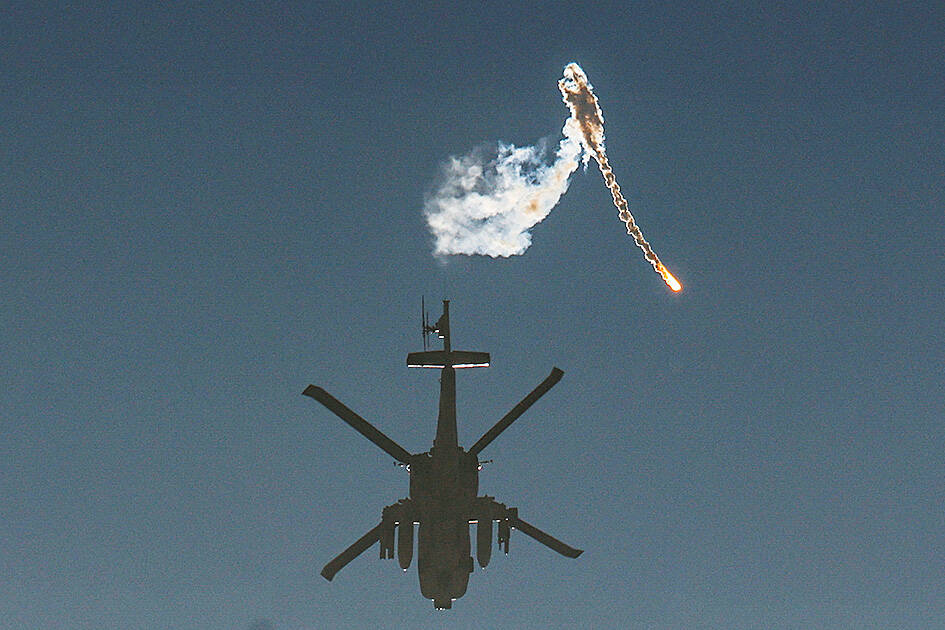Israeli fighter jets hit targets in the Gaza Strip minutes after a week-long truce expired yesterday, as the war with Hamas resumed in full force.
Black smoke billowed from the besieged territory, and Israel dropped leaflets over parts of southern Gaza urging people to leave their homes, suggesting it was preparing to widen its offensive.
In Israel, sirens warning of incoming rockets blared at several communal farms near Gaza, a sign that militants also restarted attacks, but there were no reports of hits. The renewed hostilities heightened concerns for Palestinians in the tiny coastal enclave, as well as about 140 hostages who remain there, after more than 100 were freed during the truce.

Photo: Reuters
Qatar, which has served as a mediator along with Egypt, said negotiators were still trying to reach an agreement on restarting the ceasefire. The Qatari Ministry of Foreign Affairs singled out Israel’s role in the resumption of fighting and said it “complicates mediation efforts and exacerbates the humanitarian catastrophe.”
A day earlier, US Secretary of State Antony Blinken met with Israeli officials and urged them to do more to protect Palestinian civilians as they seek to destroy Hamas.
Blinken arrived yesterday at the COP28 climate talks in Dubai, where he was to meet with Arab foreign ministers and other officials.
Israel’s retaliation for Hamas’ deadly Oct. 7 raid has killed thousands of Palestinians, uprooted most of Gaza’s 2.3 million people and led to a humanitarian crisis. Hundreds of thousands of displaced people are now crammed into the territory’s south with no exit, raising questions over how any Israeli offensive there could avoid heavy civilian casualties.
It was not clear to what extent Israeli Prime Minister Benjamin Netanyahu would heed the appeals of the US, Israel’s most important ally. Netanyahu’s office yesterday said that Israel “is committed to achieving the goals of the war: Releasing the hostages, eliminating Hamas and ensuring that Gaza never again constitutes a threat to the residents of Israel.”
In related news, the New York Times on Thursday reported that Israeli officials had intelligence that Palestinian militant group Hamas was preparing a wide-ranging attack before its Oct. 7 assault, but dismissed the reports.
The newspaper said a document obtained by Israeli authorities “outlined, point by point, exactly the kind of devastating invasion that led to the deaths of about 1,200 people.”
The document, which was reviewed by the newspaper, did not specify when the attack might happen, but provided a blueprint that Hamas appears to have followed: an initial rocket barrage, efforts to knock out surveillance, and waves of gunmen crossing into Israel by land and air.
The Times said the document, which included sensitive security information about Israeli military capacity and locations, circulated widely among the country’s military and intelligence leaders, though it was not clear if it was reviewed by senior politicians.
The warnings did not suggest that Hamas was likely to carry out the plan imminently, and the intelligence community continued to believe that Hamas leader Yahya Sinwar was not pursuing war with Israel, the Times said, likening the intelligence failure to those in the US before the Sept. 11, 2001 attacks.

The US government has signed defense cooperation agreements with Japan and the Philippines to boost the deterrence capabilities of countries in the first island chain, a report by the National Security Bureau (NSB) showed. The main countries on the first island chain include the two nations and Taiwan. The bureau is to present the report at a meeting of the legislature’s Foreign Affairs and National Defense Committee tomorrow. The US military has deployed Typhon missile systems to Japan’s Yamaguchi Prefecture and Zambales province in the Philippines during their joint military exercises. It has also installed NMESIS anti-ship systems in Japan’s Okinawa

‘WIN-WIN’: The Philippines, and central and eastern European countries are important potential drone cooperation partners, Minister of Foreign Affairs Lin Chia-lung said Minister of Foreign Affairs Lin Chia-lung (林佳龍) in an interview published yesterday confirmed that there are joint ventures between Taiwan and Poland in the drone industry. Lin made the remark in an exclusive interview with the Chinese-language Liberty Times (the Taipei Times’ sister paper). The government-backed Taiwan Excellence Drone International Business Opportunities Alliance and the Polish Chamber of Unmanned Systems on Wednesday last week signed a memorandum of understanding in Poland to develop a “non-China” supply chain for drones and work together on key technologies. Asked if Taiwan prioritized Poland among central and eastern European countries in drone collaboration, Lin

Renewed border fighting between Thailand and Cambodia showed no signs of abating yesterday, leaving hundreds of thousands of displaced people in both countries living in strained conditions as more flooded into temporary shelters. Reporters on the Thai side of the border heard sounds of outgoing, indirect fire yesterday. About 400,000 people have been evacuated from affected areas in Thailand and about 700 schools closed while fighting was ongoing in four border provinces, said Thai Rear Admiral Surasant Kongsiri, a spokesman for the military. Cambodia evacuated more than 127,000 villagers and closed hundreds of schools, the Thai Ministry of Defense said. Thailand’s military announced that

CABINET APPROVAL: People seeking assisted reproduction must be assessed to determine whether they would be adequate parents, the planned changes say Proposed amendments to the Assisted Reproduction Act (人工生殖法) advanced yesterday by the Executive Yuan would grant married lesbian couples and single women access to legal assisted reproductive services. The proposed revisions are “based on the fundamental principle of respecting women’s reproductive autonomy,” Cabinet spokesperson Michelle Lee (李慧芝) quoted Vice Premier Cheng Li-chiun (鄭麗君), who presided over a Cabinet meeting earlier yesterday, as saying at the briefing. The draft amendment would be submitted to the legislature for review. The Ministry of Health and Welfare, which proposed the amendments, said that experts on children’s rights, gender equality, law and medicine attended cross-disciplinary meetings, adding that